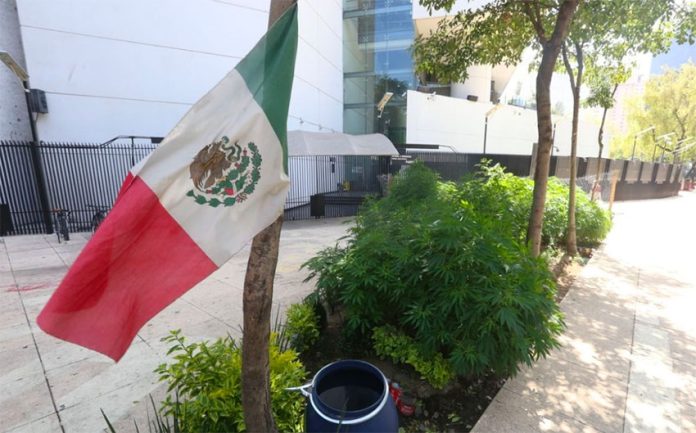Mexico is on the verge of legalizing the recreational use and commercialization of marijuana, a move that is expected to open up a new lucrative market for pot entrepreneurs both here and abroad.
The Supreme Court (SCJN), which ruled that laws forbidding the use of marijuana are unconstitutional, has given lawmakers until December 15 to draft new legislation for the recreational use of marijuana.
Ricardo Monreal, leader of the ruling Morena party in the Senate, told the news agency Reuters that he expected a law legalizing the recreational use of pot and allowing regulated private companies to sell it to be approved before December.
He predicted that Morena, which leads a coalition with a majority in both houses of Congress, is unlikely to have problems passing the law which he said would make it legal to carry a “certain amount” of marijuana.
Dutch-style cannabis cafes won’t be allowed, at least initially, but the sale of marijuana at private, strictly regulated “sales and distribution centers” will be, Monreal said.
The Senate is divided over whether to allow the industrial cultivation of hemp for products such as food, clothes and building materials, he said, because there is opposition from existing industries.
Miguel Ángel Navarro, also a Morena senator and president of the upper house’s health committee, acknowledged that lawmakers had no option but to legalize the recreational use of marijuana by December. The SCJN had set an April deadline for legalization but extended it due to the coronavirus pandemic.
Navarro told the newspaper Milenio that members of the Senate’s health, justice and legislative studies commissions will reconvene in the coming days to plot the path toward legalization.
Senators from several parties including Miguel Ángel Mancera of the Democratic Revolution Party and Jesusa Rodríguez of the Citizens Movement party have indicated in recent weeks that they support legalization of the recreational use and commercialization of marijuana, and some lawmakers have even visited a cannabis garden that was established outside the Senate building by pro-pot advocates.
Navarro said there are differences of opinions that need to be resolved with regard to issues such as how much marijuana a person can legally possess and grow for recreational purposes but expressed confidence that a consensus will be reached.
One person well positioned to cash in on legalization is Guillermo Nieto, a Guanajuato businessman who grew up smoking marijuana.

According to a report by Reuters, Nieto and several other Mexican businessmen have been preparing for the legalization of the cultivation of marijuana and its sale to recreational users for years.
In terms of population, Mexico will become the world’s biggest legal market once legislation is approved, meaning there will be plenty of opportunities for cannabis companies to cash in.
“We are expecting to create jobs and revenue for the government. We think it could really help our economy.”
Big players in the legal marijuana industry including Canada’s Canopy Growth and The Green Organic Dutchman and a division of California’s Medical Marijuana Inc. told Reuters that they were interested both the medical and recreational marijuana sectors. Medicinal marijuana was legalized in 2017 but rules for the sector weren’t outlined until July and have not yet taken effect although they are expected to come into force soon.
In addition to boosting the economy and public coffers, the legalization of marijuana will have a big social impact on Mexico, Nieto said.
“The first thing that will happen is that no Mexican will die or go to jail because of this plant,” he said. “With that, everyone wins.”
Dario Contreras Sanchez, who upon legalization plans to establish a business making products such as soap and pain-relieving oils with marijuana he would grow in Durango, said that farmers in that state – where the Sinaloa Cartel has dominated the drug trade for decades – would rather sell their plants legally than to narcos.
“Most of the people want to work legally,” said Contreras, whose sister married into the family of Amado Carillo Fuentes, a former drug lord known as El Señor de los Cielos (Lord of the Skies) because of the large fleet of aircraft he used to transport drugs.
While many Mexican entrepreneurs and foreign companies are excited about the imminent legalization of marijuana, some people are concerned that rules for both the medicinal and recreational sectors will favor big firms and not offer the opportunity for small-scale farmers to join the legal sector.
Pro-pot activists and parents of sick children who want to be able to access cannabis-based products that relieve pain say that the rules drawn up for the medicinal marijuana sector favors big business over patients.
The cultivation of medicinal marijuana for personal use is prohibited under the proposed regulations and farmers would have to partner with pharmaceutical companies that have the capacity to conduct product trials. Such partnerships are out of reach for most farmers, Reuters said.
Margarita Garfias, who has a 16-year-old wheelchair-bound son with a range of disabilities, said the medicinal marijuana rules don’t help families who fear falling foul of the law by growing or buying marijuana for therapeutic use.
“The regulation doesn’t help with this, nor with social justice or human rights for patients,” she said, adding that her home-grown cannabis-derived medicine had helped to reduce her son’s epileptic fits and the time he spends in hospital.
Health sector regulator Cofepris said that the rules are designed to ensure that people using medicinal marijuana are not placed at risk. “Medicines must have quality, safety and efficacy,” it said.
Moneral told Reuters that no law is perfect but asserted that marijuana legalization will transform Mexico, explaining that recreational pot smokers will no longer be prosecuted and farmers will – contrary to some claims – be able to move away from supplying drug cartels and move into the legal sector.
“The most important thing for Mexico and its legislators is that they dare to knock down this decades-old taboo,” he said.
